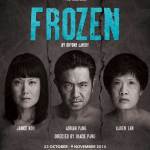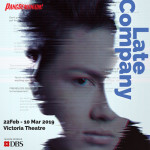“Dragonflies Drags On“
Reviewer: Cordelia Lee
Performance: 24 August 2017
Dragonflies opens with a bang. Rumbling thunder and rainfall spill onto a pristine minimalist set. Midway, intense LED bars descend from the rigged theatre heavens, creating the sterile ambience of a clinic. Side lights plot with absolute precision spill from booms hidden in the wings, hitting bodies on stage to form faint silhouettes. A fire breaks out and is quelled without being a hazard. And a hint of fog is released, giving a dreamlike illusion whenever Adrian Pang talks to the dead.
The aesthetics are indomitable, as usual.
Set in a xenophobic post-Brexit world, Leslie Chen’s (Adrian Pang) UK citizenship is revoked after his wife’s death. Evicted and homeless, he is sent packing for Singapore with his step-daughter Maxine Wilson (Selma Alkaff).
If you can’t picture all that, it’s alright. Imagine watching a beautifully edited blockbuster drama in the cinema. The effect is similar.
But therein lies the problem – Dragonflies isn’t a film, it’s a live play.
Lines are delivered on cue without a hitch – the cast is well-rehearsed and must be commended. Yet, there is something strangely mechanical about the entire process that drives the illusion of the narrative on stage.
You don’t see a character airing his thoughts for the very first time. What you see is the actor, automatically running lines and performing his actions, probably for the hundredth time. Liveness is lacking and the physical acting score, comfortably formalised. When a xenophobic British national confronts Leslie in a clinic, his reaction lacks the nuances of restrained frustration expected of a man caught off-guard in a racist diatribe. Pang’s composed body language isn’t so much a result of his character’s desire to avoid conflict, as it is an anticipation of this fictional antagonism as an actor. He sees it coming before it does. It is stage action without spontaneous reaction. And with this lack, the visceral element unique to theatre is lost.
Additionally, excessive expositions plague the scenes. Perhaps it’s unavoidable. Dragonflies delves deep into character psyche to expose intricacies of social relationships across times and locations – all within two hours. Nonetheless, long chunks of spoken text quickly become tiresome to follow. Mentally filtering out key points of the discourse to keep up with narrative progression becomes the only viable option.
If not for smaller roles and the brief reflexive moments they bring on stage, I may have disengaged completely.
Frances Lee plays Agnes, a Filipino help with an infectious perkiness. Her inner child emerges during a friendly rebuttal with her employer, Margaret, about a television actor’s looks. Eager to convince Margaret of her views, she nudges her and giggles shyly, suddenly becoming more than a foreign domestic worker hired in the family sphere. Agnes becomes part of the family, and this is heart-warming. Likewise, Shrey Bhargava’s single line as a nameless police officer is beguiling. He shuffles around the room and begrudgingly picks up a laptop for inspection. He stares at it – channelling the honest vibes of an overworked, jaded law-enforcer – before sighing deeply: Banyak videos sial! And in that moment, I see a real police officer.
Dragonflies offers what Pangdemonium does best – slick realism set against a stunning stage design. However, this never fully compensates for what it lacks elsewhere. At its core, Stephanie Street’s long-winded script highlights the potentially fatal consequences of pressing global issues. There is a need to undo the normalisation of racial prejudice, passivity towards climate change, and disillusionment regarding the ongoing refugee crisis in our present world.
For now, Dragonflies’ message of hope is its saving grace.
Do you have an opinion or comment about this post? Email us at info@centre42.sg.
ABOUT THE PRODUCTION
DRAGONFLIES by Pangdemonium
24 – 26 August 2017
Victoria Theatre
ABOUT THE REVIEWER
Cordelia is a second-year Theatre Studies and English Linguistics double major. She views the theatre as a liminal space providing far more than simply entertainment, and she especially appreciates avant-garde performances.





